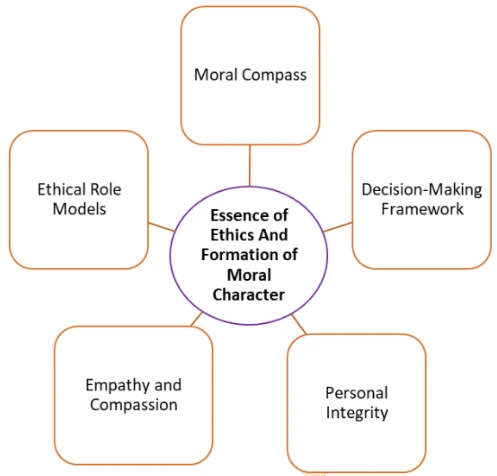Answer:
How to approach the question
- Introduction
- Briefly discuss the essence of ethics and formation of the moral character
- Body
- Explain the contribution of the essence of ethics in the formation of moral character.
- Describe the associated concerns.
- Give a way forward.
- Conclusion
- Conclude on a positive note.
|
Introduction:
The essence of ethics encompasses fundamental principles and values that guide human behaviour and decision-making. Whereas, the moral character forms through the conscious cultivation of ethical values and virtues, shaping individuals to consistently act in accordance with their principles and exhibit virtuous behaviour.
Body:
Contribution Of The Essence Of Ethics To The Formation Of Moral Character:
- Moral compass: Ethics shapes moral character by guiding the evaluation of actions and nurturing virtuous qualities, as seen in Mahatma Gandhi’s unwavering commitment to nonviolence and truthfulness.
- Decision-making framework: Ethics guides decision-making by assessing moral implications and aligning actions with personal values. Edward Snowden’s ethical choice to expose surveillance practices violating privacy rights illustrates this framework.
- Personal integrity: Ethics fosters personal integrity, influencing moral character formation. Nelson Mandela’s unwavering integrity in the fight against apartheid exemplifies this.
- Empathy and compassion: Ethics molds moral character through empathy, compassion, and responsibility, exemplified by Malala Yousafzai’s advocacy for girls’ education and compassionate response to adversity.
- Ethical role models: like Martin Luther King Jr., inspire moral character formation through their unwavering commitment to justice and equality, shaping individuals to emulate their virtuous principles.
Associated Concerns:

- Cultural Relativism and Subjectivity: Balancing diverse cultural perspectives and individual variations in defining universally applicable virtues.
- Moral Dilemmas and Conflicts: Testing moral character through complex ethical decision-making in the face of conflicting choices.
- External Influences and Ethical Gray Areas: Navigating conflicting external factors and ambiguous situations that challenge moral character formation.
- Moral Development and Maturity: Lifelong struggle to consistently live up to ethical ideals and grow in moral character.
- Moral Hypocrisy: Addressing the misalignment between professed values and actual behaviour to foster genuine moral character.
Way Forward:
- Education and Awareness: Promote ethics education to shape moral character.
- Critical Thinking and Ethical Reasoning: Develop skills to navigate moral dilemmas.
- Role Models and Mentorship: Emulate ethical leaders and provide guidance for character development.
- Reflection and Self-Examination: Foster self-reflection for personal growth in morals.
- Ethical Structures: Create environments that reward and support moral behaviour.
Conclusion:
In conclusion, the essence of ethics positively influences the formation of moral character, offering hope for a future where individuals embody virtuous values, make ethical choices, and contribute to a more compassionate and just society.
To get PDF version, Please click on "Print PDF" button.


https://uploads.disquscdn.com/images/c46368b8aeec9f347a7131cfc47f84319ed46f4ba9b58fd2b4fe127011f49efc.jpg https://uploads.disquscdn.com/images/10534fb34b9d0191097079d33afde177e67890e728cab66ca9afa60fad7e9acb.jpg